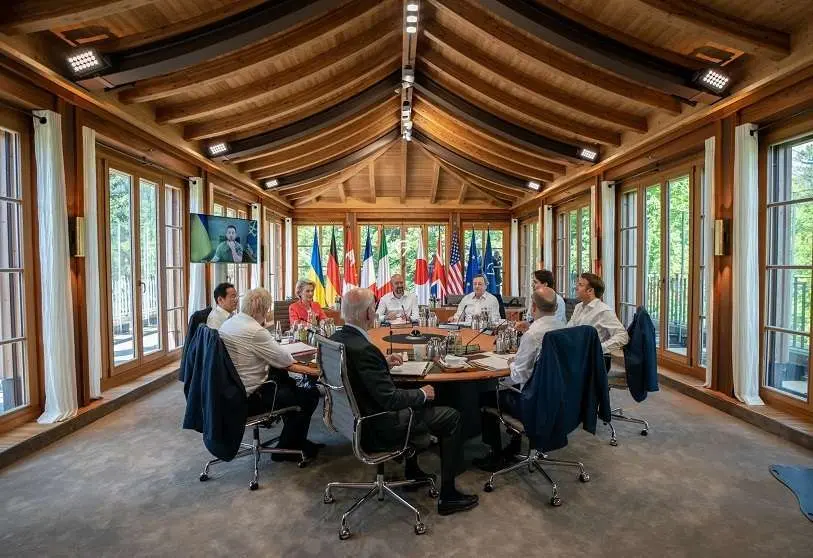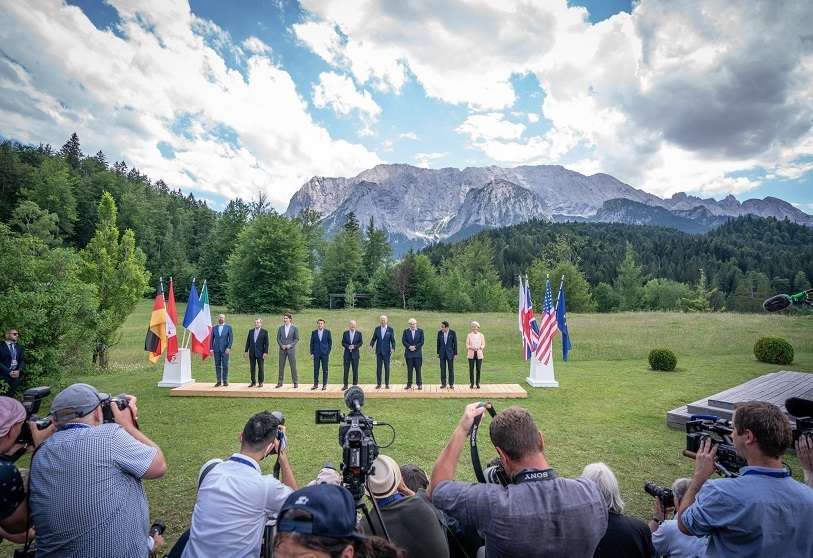G7 consolidates anti-Putin coalition and limits Russian oil prices

The G7 leaders have been meeting since Sunday at Elmau Castle, a luxurious hotel in a small town in southern Germany near the Austrian border. From there, the Biden, Trudeau, Jonhson, Macron and co. have been plotting to push through a new package of sanctions against Russia in response to its full-scale invasion of Ukraine that would cap the price of Russian oil, according to Reuters. "The G7 will issue a statement of support for Ukraine, including significant new sanctions commitments to further intensify our economic measures against Russia," the White House said in a statement.
The seven leading industrialised democratic nations, which welcomed Putin's Russia as a full member in 2002, are now working to sink Russia's economy in order to bring the Kremlin's bloody military campaign in the former Soviet republic to a halt as soon as possible. The G8's idyll was to last 12 years, until Moscow decided to occupy the Crimean peninsula. Its participation has since been suspended, and is unlikely to return anytime soon when the stated goal is to 'further isolate Russia from the world economy'.
The leaders of the United States, Canada, the United Kingdom, France, Germany, Italy and Japan, represented by the European Union, on Monday approved a new round of sanctions against Russia that includes for the first time the imposition of a price cap on Russian oil imports, a measure designed to significantly reduce its revenues. It remains to be seen how this cap will be implemented, but the commitment of the so-called 'Group of Seven' seems unwavering.

There would be three ways to limit prices: form a purchasing cartel and threaten importers who exceed the cap with sanctions; apply a massive tariff on Russian oil and gas imports; or impose targeted sanctions to prevent Russia from converting oil revenues into less liquid currency, a measure that could be carried out through the imposition of sanctions on Russian entities involved in oil sales, as explained by economists Brian O'Toole and Daniel Fried in the Atlantic Council.
The limitation of 'black gold' prices is a blow to the Russian economy. "The G7 leaders' dual objective has been to directly target President Vladimir Putin's revenues, particularly through energy, but also to minimise the spillover effects and impact on the G7 economies and the rest of the world," Reuters quotes US administration sources as saying. Western leaders are faced with the challenge of limiting Russia's energy revenues without causing global economic damage, a tricky balancing act amid a backdrop of record high energy prices and runaway inflation.
"The United States has brought together more than 30 allies and partners around the world to impose drastic costs on Russia, and the US-led coalition will continue to increase pressure on Putin," the White House said in a statement. The Biden administration has added at least a hundred new names of individuals and entities to the sanctions blacklist and announced the imposition of tariffs on Russian goods. The G7 leaders are also considering limiting the price of Russian gold, the second most important sector of the Russian economy after energy.
The German Presidency also invited five partner countries to attend the G7 Summit: Argentina, India, Indonesia, Senegal and South Africa. In a joint session with international organisations they discuss global challenges they share. #G7GER pic.twitter.com/3bpmWi1jlD
— G7 GER (@G7) June 27, 2022
The White House claims that "U.S. exports to Russia, including critical technological inputs Putin needs to maintain his military, have declined by approximately 97%. Russian imports of goods from around the world could fall by 40%. Factories across Russia are struggling to maintain production". According to this version, Western sanctions as a whole are having the effect desired by the grand coalition against Putin.
"Russia's GDP is likely to shrink by double digits, inflation is rising to over 20%, Russia is struggling to make bond payments, and Russia has defaulted on its sovereign debt for the first time in over a century," the White House claimed in a note on the same day that Bloomberg reported Russia's default on its foreign sovereign bonds of 100 million euros in interest for the first time since 1998 after the expiration of the 30-day grace period. A default flatly rejected by Kremlin spokesman Dmitry Peskov.
"Sanctions don’t normally work. So far extremely harsh Western sanctions against Russia have failed miserably to hurt the Russian economy", international oil economist and World Bank consultant Mamdouh Salameh tells Atalayar. "They are in fact hurting the economies of those who imposed them them far more than Russia. I would go as far as to say that the Russian economy is flourishing under sanctions because it was well prepared for them."
"Russia's economy is self-sufficient," says Salameh. "Russia is also the world's largest exporter of energy and food materials as well as precious metals. It also has the world's largest nuclear arsenal".

For sanctions to bear fruit, the West needs to reach beyond its geographical borders and forge alliances with other actors that have so far decided to maintain a posture of containment. One such actor is Narendra Modi's India, which was one of the five leaders of the nations invited to the G7 summit. For the moment, the aim of the strategy is to prevent a decisive Russian military victory in the short term, which could induce Putin to reach a deal on terms more favourable to Ukraine, rather than negotiating with him while he controls large amounts of Ukrainian territory.
Ukrainian President Volodymir Zelensky appeared in a video-conference meeting during the G7 leaders' retreat in the Bavarian Alps to ask his partners for more weapons, specifically air defence systems, more sanctions against Russia, help in exporting grain from Ukraine's Black Sea ports and funding for reconstruction. At the end of the conversation, the G7 again closed ranks with Ukraine and pledged to maintain "whatever support is necessary for as long as it is necessary".
The Biden Administration confirmed that the G7 "will commit to help Ukraine meet its short-term budget financing shortfalls, including a commitment of $7.5 billion from the recently approved second supplemental". In addition, White House National Security Advisor Jake Sullivan confirmed on the sidelines of the G7 summit in Germany that the next military aid package to Ukraine "includes advanced air defence capabilities".








